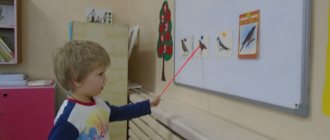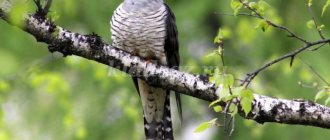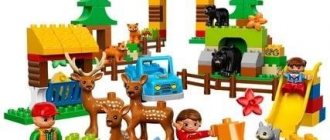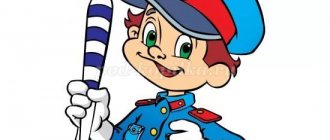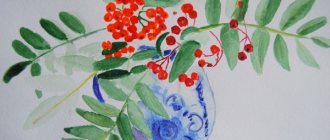Organized educational gaming activities in the middle group
Organized educational gaming activities in the middle group
Topic: Shopping
Educational objectives: •Give an idea of the work of a freight forwarder and merchandiser •Consolidate children’s ideas about different stores and professions - salesperson, cashier, security guard, director •Develop skills in grouping objects based on common characteristics •Exercise the ability to write a descriptive story about a toy Developmental tasks: •Develop the ability to accept the game task set by the teacher, act according to the rules; •Develop cognitive interest •Promote the development of control and self-control functions Educational objectives: •Develop the ability to communicate with each other, make decisions together;
•Cultivate responsiveness and kindness. Material: pictures depicting furniture, clothing, shoes, vegetables, dishes; Bunny, many different toys. Progress:
— Guys, this morning, when I was going to work, I met...look who? - Bunny. - That's right, I was very surprised, because hares live... - In the forest. - It turns out that this Bunny doesn’t know what a store is and has never been to a store! I promised him that you could help him. Can you? — Where are shops usually located? Children's answers. — What types of stores are there? Children's answers. — Who works in the store? — How do you think goods appear in stores? Children's answers. — That's right, they are brought in cars from the base. Or maybe you know who works at the base? — Listen, there is a commodity specialist at the base, he is responsible for the quality and quantity of goods. There is also a freight forwarder working there, he delivers the necessary goods to stores. - Let's put the Bunny in, let him look, and today we will deliver goods from the base to the shops, i.e. who will we become? That's right, freight forwarders. And I will be a merchandiser. Pictures depicting dishes, furniture, clothes, shoes, vegetables, fruits, toys and tools are laid out on the table. Other tables are shops. Each table is marked with a card - a symbol. Children, as instructed, take cards and take them to the appropriate store. When all the goods have been taken to the stores, I invite the children to go through the stores and see if everything is in order. If the children did everything correctly, i.e. Only shoes were brought to the shoe store, and only fruits and vegetables were brought to the vegetable store, unnoticed by the children, I put in goods that are not suitable for this store. Children find and explain why this product is superfluous. After all the stores have been checked, I invite the children to become sellers. Sellers are given the task of putting the goods on shelves. In the “Clothing” store, summer clothes should be placed on the top shelf, winter clothes on the bottom shelf, and demi-season clothes on the middle shelf. In the "Shoes" store - by analogy with clothes. In the "Tables" store - tea utensils on the top shelf, kitchen utensils on the lower shelf. In a grocery store, put vegetables on the top shelf, fruits on the bottom shelf. In a furniture store, put furniture for the living room (hall) in the middle, furniture for the kitchen on the left, and furniture for the bedroom on the right. After completing the task, the children, the teacher, and the Bunny go from store to store, and the sellers talk about their store and product. Then I invite the children to go to my favorite store, only to do this they need to choose the right path - it is not long, not red and not straight. Children along the path come to the store. “Now close your eyes and count to four.” At this time I take off the blanket. — What is the name of my favorite store, how did you guess? Well done, this store is called “Toy World”, it is not just a store, but a magical one - you can buy one toy there without money. Only for this you need to tell about it: what it is called, what it is, what you can do with it, what to play. — You were freight forwarders, sellers, and now what will you become? That's right, buyers. Children take turns choosing a toy and writing a short story about it. The phone rings, I answer: “The toy store salesman is listening!” Bunny? Yes, he's here, don't worry, he's fine, he'll come home soon. I will definitely see you off, all the best, goodbye! - Guys, the bunny mother called, she’s worried about her son, so he’ll have to run home to the forest. I think that Bunny will try to remember everything that we told him about the shops, and if he forgets, again, he will ask his mother for time off and come running to us. Let's give him a toy as a souvenir. Only Bunny wants the one that is made of plastic, consists of several different rings that can be taken off and put on again. What kind of toy is this? How did you guess that the Bunny chose the pyramid? Well, you guys are great, I would never have guessed it! Now let's say goodbye to the Bunny and I'll take him to his mother, while you play with your new toys.
We recommend watching:
Summary of a lesson in the middle group on the works of Marshak Notes of the GCD in the middle group “Help the Cockerel” Summary of the GCD in the middle group on the topic: “Who lives in the little house?” Summary of a design lesson in the middle group "Tumbler"
Similar articles:
Math lesson “Rectangle” in the middle group of kindergarten
Summary of organized play activities for children in the middle group “How the guys helped the little bunny”
"Give me a smile"All the children gathered in a circle.
I am your friend and you are my friend.
Let's hold hands tightly
And let's smile at each other.
The teacher draws the children's attention to a picture of a forest.
IN.:
Guys, do you want to go to the forest?
D.:
Yes.
IN.:
Then I will ask you to divide into 2 teams and stand behind each other. Each of you will have to walk along a narrow short and wide long path. The task must be completed quietly so as not to scare away the forest inhabitants. Let's all meet on the green clearing.
Well done!
IN.:
Guys, what paths did we meet on the way? Which path was easy to follow and which was difficult? Why?
Children's answers
IN.:
Oh! Someone is crying, I'll go and have a look.
Guys, a little bunny has come to us.
Probably the little bunny came to us for a reason, something happened to him, I’ll ask him.
The little hare says that he has nowhere to live. He really asks us to help him build a house, but to do this we must solve difficult tasks. He couldn’t cope alone, so he came to us for help.
IN.:
Well, guys, let's help our little bunny complete his tasks?
D.:
Yes
IN.:
Then also quietly go to the stump chairs.
Here is the first task: “To build a house you need to choose a clearing where birch and spruce trees grow.”
Look, there are trees in the forest clearing. How many are there?
D.:
A lot of.
What are more birch trees or fir trees? Why? What needs to be done so that there are equal numbers of birches and fir trees? Here is another birch tree. What can we say now about the number of birch trees and fir trees? That's right, they are equal!
How many mushrooms are there in the clearing? How many flowers?
D.:
No one.
IN.:
Well done! We did it.
IN.:
And here is the next task.
The little bunny gave us bags. Let's see what's in my bag?
Pasha come to me, close your eyes and feel what is there.
Pasha: Geometric figures.
IN.:
Guys, go to the tables and take 2 geometric shapes out of the bag.
Raise your hand, those who got brown rectangles? Green circles? Yellow square? Red triangle? Green triangle?
Which object has a triangular shape? Which object is square? Which object is rectangular in shape? Which object is round in shape?
Children's answers
IN.:
Guys, using these geometric shapes, I propose to build a diagram of a bunny’s house on a sheet of paper. It will be located between birch and spruce.
IN.:
What's to the right of the house? What's to the left of the house?
Children build with their geometric shapes.
Well done, you also coped with this task. Now let's rest a little.
The little bunny says he wants to play with us.
They are jumping and jumping in the forest. Hares are gray balls (Hands near the chest, like the paws of hares; jumping). Jump - hop, jump - hop - The little bunny stood on a stump (Jumping forward - back) Lined everyone up in order, began to show exercises. One! Everyone walks in place. Two! They wave their hands together. Three! They sat down and stood up together. Everyone scratched behind their ears. They stretched for four. Five! They bent over and bent over. Everyone stood in a row again and walked like a squad.
IN.:
Oh! Look, guys, there's something here! Those are stripes! Look how different they all are; There are long ones and short ones. Let's collect them! Everyone will take two strips so that there is enough for everyone.
Have you collected it?
The teacher asks the children which strips they have in their hands.
IN.:
Okay, well done!
IN.:
Guys, we have two baskets. Place the long strips in the yellow bin and the short strips in the green bin. Well done!
The little bunny is so happy! You helped him do all the difficult tasks. Now he has a diagram of the house. Let's say goodbye to him!
They say goodbye.
IN.:
It's time for us to return to the group too.
And we will return along the same paths along which we came here. They lined up one after another.
Guys, let's remember what interesting tasks we performed? Did everything work out for you? What did you like?
Guys, you helped the bunny a lot, but our journey is over.
